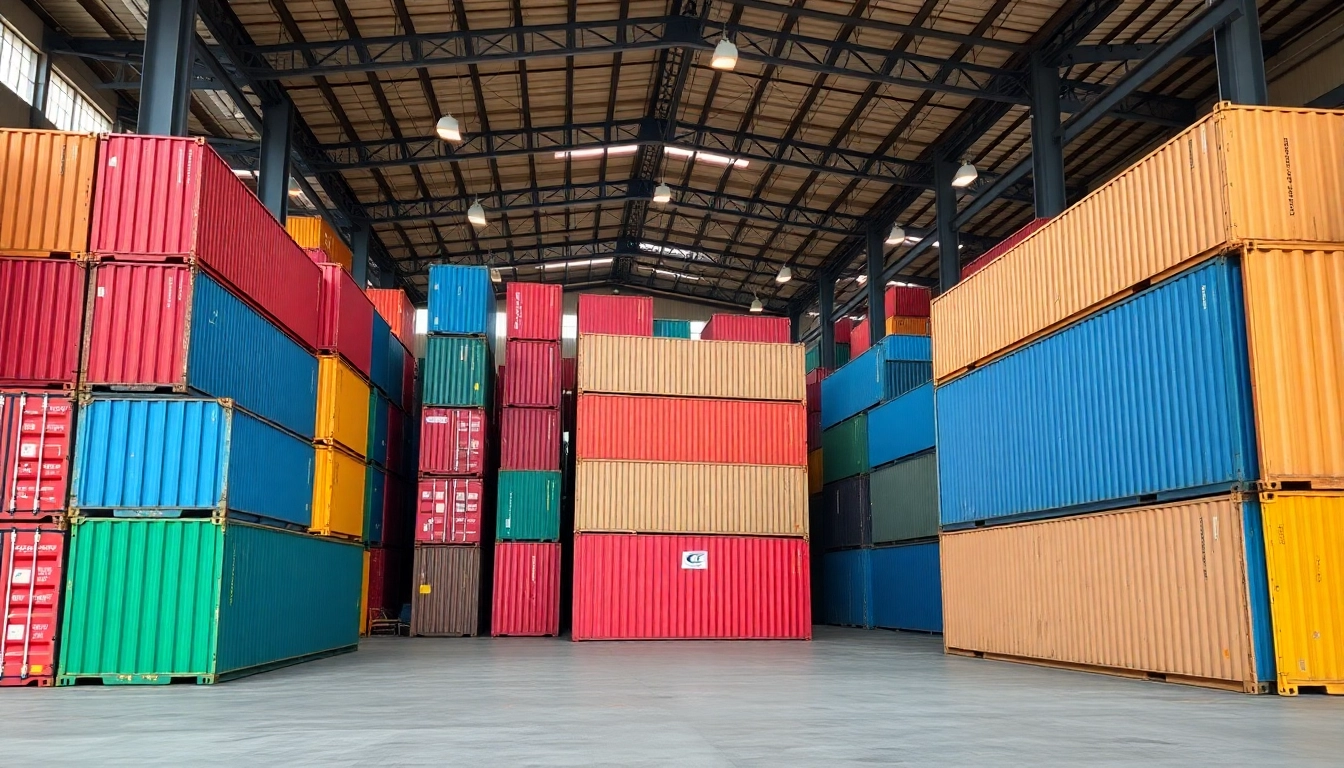Understanding Container Rental: Types and Applications
Container rental has become an essential component of modern logistics, storage, and construction industries across the UK. Whether businesses require temporary storage solutions, transportation options, or long-term onsite facilities, renting containers offers flexibility, cost-effectiveness, and reliability. As the demand for portable, durable, and secure storage options grows, understanding the various types of containers available and their applications becomes crucial for making informed decisions. In this comprehensive guide, we delve into the different types of rental containers, their use cases across industries, and tips for selecting the optimal size and type for your needs.
Different Types of Containers Available for Rent
The UK market offers a diverse range of shipping and storage containers tailored to various business requirements. The most common types include standard shipping containers, storage containers, site and welfare containers, and specialized units designed for unique applications.
Standard Shipping Containers
Typically ranging from 10ft to 45ft in length, these containers are primarily used for transportation and storage of goods. They are manufactured to ISO standards, ensuring durability and stackability, making them ideal for international shipping as well as inland storage. The most popular sizes for rental purposes are the 20ft and 40ft units, known for their versatility and ample capacity.
Storage Containers
Designed for secure, on-site storage, these containers are often fitted with enhanced security features such as lock boxes and high-strength doors. They are available in various sizes, including 10ft, 20ft, and 30ft, and are used extensively in construction sites, retail, and commercial storage applications. Some providers also offer insulated or climate-controlled units for sensitive inventory.
Site and Welfare Containers
These units serve multifunctional purposes, including site offices, staff welfare facilities, and portable restrooms. Usually constructed with additional insulation, electrical fittings, and utilities, they support construction and industrial projects where temporary onsite infrastructure is required.
Specialized Containers
For niche applications, industries utilize specialized units such as refrigerated containers, tunnel containers, offshore units, and high-security variants. These are tailored to specific operational challenges, offering solutions like temperature-controlled storage or enhanced security features for valuable goods.
Common Uses of Rented Containers in Various Industries
The adaptability of container rentals makes them invaluable across multiple sectors. Here are some predominant industry applications:
- Construction and Infrastructure: Temporary site storage, equipment storage, onsite offices, and welfare facilities. Containers offer rapid deployment, flexibility, and compliance with safety standards.
- Retail and Commercial: Seasonal storage, event equipment, and stock management. Retailers use containers to handle overflow inventory or as on-demand storage spaces.
- Manufacturing: Raw material storage, parts logistics, and emergency warehousing solutions. Containers facilitate efficient supply chain management and reduce downtime.
- Logistics and Transport: Shipping, transshipment, and cross-docking facilities. Renting containers supports seamless movement of goods across different modes of transport.
- Disaster Relief and Humanitarian Aid: Rapid deployment of secure, mobile storage units in disaster zones for supplies, equipment, and shelter materials.
Moreover, the trend toward flexible and temporary storage solutions has expanded container usage in environmental projects, agriculture, and even residential modifications. Its versatility ensures that almost any operational need can be met with the appropriate rented container.
Choosing the Right Container Size for Your Needs
Selecting the appropriate container size is essential to optimize space, manage costs, and ensure operational efficiency. Several factors influence this decision:
Assessing Volume and Weight
Begin by estimating the volume of items to be stored or transported. For example, small tools or documents might only require a 10ft container, whereas large equipment or bulk goods might necessitate a 40ft unit. Consider the weight limits as well, especially for heavier loads, to ensure safety and compliance with safety standards.
Understanding Accessibility and Site Constraints
Evaluate your site’s spatial limitations, access points, and delivery logistics. A narrower 10ft container might be beneficial where space is tight, while larger containers are suitable for expansive sites with ample room for maneuvering and storage.
Matching Utility to Industry Needs
Different industries have specific requirements. Construction projects often prefer 20ft containers for their balance between capacity and mobility. In contrast, manufacturing facilities may opt for 40ft containers to accommodate larger inventory volumes.
Cost Considerations
While larger containers tend to be more expensive, rental prices are also influenced by duration, location, and additional features. Balancing size with your actual need can lead to significant cost savings.
In conclusion, a thorough needs assessment coupled with consultation from trusted container providers can help you identify the most suitable container size for your project.
Benefits of Choosing Professional Container Rental Services
Cost Efficiency and Flexible Rental Terms
Partnering with reputable container rental companies offers significant financial advantages. Instead of investing in purchasing containers outright, businesses gain access to a range of sizes and features at manageable rental rates. Flexible terms—ranging from short-term to long-term agreements—allow organizations to scale operations efficiently without the burden of ownership costs. According to industry analyses, rental prices can start as low as £10 per week, making container rental an economical alternative to capital expenditure.
Enhanced Security and Durable Storage Solutions
Security is a paramount concern, especially when storing valuable or sensitive materials. Top-tier container providers equip their units with high-security features such as lock boxes, reinforced doors, security seals, and anti-vandal construction materials. These features significantly reduce risks of theft or tampering. Additionally,42 containers are manufactured with corrosion-resistant steel and weatherproof coatings, ensuring longevity and reliable protection against the elements in the UK’s variable climate.
Fast Delivery and Convenient Site Management
One of the distinct advantages of professional container rental services is the swift deployment of units. Companies like Container rental specialists offer quick turnaround times, often delivering and installing containers within days of order placement. This rapid response capability minimizes project downtime. Furthermore, many providers offer comprehensive site management solutions, including logistics, maintenance, and removals, simplifying operational oversight and reducing administrative burdens.
How to Reserve and Manage Your Container Rental in the UK
Step-by-step Rental Process and Requirements
Embarking on a container rental involves a streamlined process designed to ensure ease and clarity:
- Identify your needs: Determine the container size, type, and duration of rental based on your operational requirements.
- Research providers: Choose reputable companies with positive reviews, proven delivery capabilities, and comprehensive support like Container rental services.
- Request quotes and compare: Obtain estimates, inquire about additional fees, and evaluate rental terms.
- Place the order: Confirm specifications, delivery date, and payment arrangements.
- Prepare the site: Ensure access routes and installation spaces are ready for quick delivery.
Documentation and Payment
Most providers require standard documentation like proof of identity, business credentials (if applicable), and payment arrangements. Contracts specify delivery, collection, and maintenance responsibilities.
Tips for Optimizing Container Usage and Access
- Plan your site layout to facilitate easy access and movement around the container.
- Label containers and organize stored items systematically for efficiency.
- Implement security measures such as locks and surveillance if storing high-value materials.
- Regularly inspect containers for damages or security breaches and schedule maintenance accordingly.
Understanding Rental Agreements and Maintenance
Rental agreements detail the terms of use, including duration, payment, delivery arrangements, and responsibilities. Maintenance is typically managed either by the provider or the client, depending on the contract. Regular inspections ensure ongoing security, weatherproofing, and structural integrity.
Maximizing Value: Cost Factors and Rental Tips
Comparing Rental Prices Across Providers
Rental prices vary based on container size, type, rental duration, and provider location. Prices generally range from under £60 per month for a basic 20ft unit to higher rates for specialized or reinforced containers. It’s essential to obtain multiple quotes and consider added costs such as delivery, setup, and collection fees to accurately assess total expenditure.
Additional Fees—Delivery, Collection, and Insurance
Most providers charge for delivery and pickup, which can fluctuate based on distance and site accessibility. Insurance options may be available or required, especially for valuable contents, and should be factored into the total cost. Clarifying these fees upfront helps prevent unexpected expenses.
Best Practices for Long-term Container Use
Long-term rentals benefit from periodic maintenance, weatherproofing, and security upgrades. Establishing a maintenance schedule and inspecting containers regularly can extend their lifespan and ensure continued security. Negotiating renewal terms ahead of time can also provide cost advantages and operational stability.
Future Trends in Container Rental and Storage Solutions
Emerging Innovations in Portable Storage
The container industry is evolving with advancements such as modular stacked units, hybrid systems integrating storage with energy solutions, and pre-fabricated container complexes designed for specific industries. These innovations aim to improve flexibility, scalability, and sustainability while reducing costs.
Sustainable Practices in Container Manufacturing and Leasing
Sustainability is increasingly influencing the sector, with more providers offering eco-friendly materials, recycling programs for used containers, and energy-efficient modifications. Eco-conscious designs reduce carbon footprints and appeal to environmentally aware clients.
Integrating Smart Technology for Container Management
The future points toward ‘smart containers’ equipped with IoT sensors for real-time monitoring of security, environmental conditions, and location tracking. Such innovations enhance operational control, reduce theft, and enable predictive maintenance, revolutionizing how storage solutions are managed.





